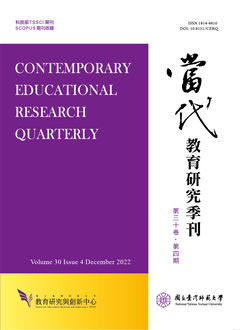

本文以杜威的教育思想為論述軸心,整理與分析自1919至1930年初期的教育雜誌與時人論著,探究杜威學說在臺灣之引進與實踐。在引進的理論上,歸納出五項要點,包括教育即生長、教育應貼近生活之必需、重視兒童的生活經驗、學校教育與社會之結合,以及學校的道德教育。在教學法的實踐面上,該時期重視兒童個別差異、強調兒童實際生活,以及「做中學」與「自學主義」,並考察其教學活動的成效與檢討。再者,探究林茂生對杜威進步主義與民主主義觀之運用。最後,從杜威思想傳入臺灣之轉化內涵來看,發現該學說在臺灣強調進步主義的教育,卻忽視民主本質。研究也發現,有些臺籍教師已能以具深度與廣度的方式闡述杜威理論,並將其落實於教育現場中。
This paper aims to investigate how Dewey’s thoughts in education was introduced to and implemented in Taiwan through analyzing educational journals, and related articles and books from 1919 to early 1930. Based on the author’s analysis, five key concepts of Dewey’s educational thoughts were introduced to Taiwan, including education as growth, the relatedness between education and the needs in life, the importance of children’s experience, the interplay of school and society, and moral education in school. Concerning the pedagogical practice during late Japanese colonial period, the author found that individual differences, children’s living experiences, “learning by doing” and “self-study”, as well as the evaluation of effects of pedagogical activities were emphasized. In addition, Dr. Lin Mosei’s application of Dewey’s progressivism and the concept of democracy were also explored in this study. Lastly, this study found that the introduction of Dewey’s philosophy tended to promote the progressive education rather than the essence of democracy. Nevertheless, some Taiwanese teachers were able not only to develop in depth discourse on Dewey’s theory but also to implement it in school settings.

本著作係採用創用 CC 姓名標示-非商業性 3.0 台灣 授權條款授權.
本刊國立台灣師範大學教育研究與創新中心
106台北市和平東路一段162號 | 電話: 02-7749-3670 | E-mail: cerecerq@gmail.com
教創中心 | 師大 | 電子報 | 線上投審系統
本刊由國家科學及技術委員會人文社會科學研究中心補助經費
© 2014 CERI-NTNU
